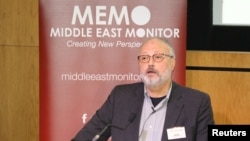Turkish officials have concluded that a Saudi Arabian journalist, who had been living in a self-imposed exile in the U.S., was killed in the Saudi consulate in Istanbul last week when he went there to get a document for his upcoming marriage.
Saudi officials say the allegations are baseless, although the journalist, 59-year-old Jamal Khashoggi, has not been seen for days.
Jamal Khashoggi's fiancee, who waited for him outside the consulate Tuesday, says he never came out of the building.
Turkish President Recep Tayyip Erdogan told reporters Sunday, "I am following the [incident] and we will inform the world whatever the outcome" of the official probe. "God willing, we will not be faced with a situation we do not want."
Erdogan said police are looking at surveillance video of the consulate's entrances and exits, as well as at the Istanbul airport.
Police said earlier that about 15 Saudis arrived in Istanbul on two flights last Tuesday and were at the consulate at the same time as Khashoggi.
Khashoggi, a Saudi national and a contributor to The Washington Post, went into exile last year when Saudi authorities began to crack down on dissident voices. The journalist had been critical of Saudi Crown Prince Muhammad bin Salman.
Asked about reports that the journalist was killed in the Saudi consulate, a State Department spokesperson said "We are not in a position to confirm these reports, but we are closely following the situation."
A Turkish official told the Reuters news agency: "The initial assessment of the Turkish police is that Mr. Khashoggi has been killed at the consulate of Saudi Arabia in Istanbul. We believe that the murder was premeditated and the body was subsequently moved out of the consulate."
Reuters' Turkish sources did not say how they thought Khashoggi was killed.
The Washington Post editorial board said Sunday that Saudi Arabia, Turkey and the United States "bear inescapable responsibility" to act in response to Khashoggi's disappearance.
The board said Saudi Arabia has to identify the 15 officials who were at the consulate and exactly what happened inside. Turkey, it said, must back up its conclusion Khashoggi was killed by making public any evidence it has.
And the board said the United States should demand answers from Saudi Arabia about the case, and if the crown prince does not cooperate fully then Congress should suspend military cooperation with Saudi Arabia.
Amnesty International’s Middle East Research Director Lynn Maalouf said if the reports of Khashoggi's killing are true, it "would be an abysmal new low" and "amount to an extrajudicial execution. This case sends a shockwave among Saudi Arabian human rights defenders and dissidents everywhere, eroding any notion of seeking safe haven abroad."
A New York Times account, however, reports that Turan Kislakci, a friend of Khashoggi and head of the Turkish Arab Media Association, said that Turkish officials had called him and confirmed two things — that Khashoggi was killed and his body was dismembered.
Multiple media reports say that a group of 15 Saudi citizens descended on the consulate Tuesday and later left. Turkish officials are trying to identify them as part of their probe into Khashoggi's disappearance.
The New York Times account says their sources report the Saudis "had arrived to silence Mr. Khashoggi, but that it was not clear if the plan had been to bring him back to Saudi Arabia alive, and something went wrong, or if the intention was to kill him there."
Mohammad al-Otaibi, the Saudi consul-general in Istanbul opened the mission up to Reuters Saturday to show that the missing journalist was not on the premises. Reuters reports that Otaibi walked the reporters through all six floors of the building, including storage and security rooms.
Reuters also reported, however, that Otaibi said that the consulate "was equipped with cameras, but they did not record footage, so no images could be retrieved of Khashoggi entering or leaving the consulate, which is ringed by police barriers and has high security fences topped with barbed wire."
It was not immediately clear why the cameras did not work.
Fred Hiatt, the director of The Washington Post editorial page said in a statement, "If the reports of Jamal's murder are true, it is a monstrous and unfathomable act."
Cengiz, Khashoggi's Turkish fiancee, told the New York Times that Turkish officials have not confirmed Khashoggi's death with her. She told the newspaper, "I cannot think such an incident is acceptable to happen in Turkey."
Nike Ching contributed to this report.






